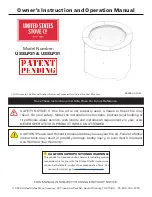
www.desatech.com
108862-01E
4
PRE-iNSTALLATioN
PREPARATioN
LOCAtION AND SPACE REqUIREMENtS
Determine the safest and most efficient location for your DESA
direct-vent fireplace. Make sure that rafters and wall studs are not
in the way of the venting system. Choose a location where the heat
output is not affected by drafts, air conditioning ducts, windows
or doors. Figure 2 shows some common locations. Be aware of all
restrictions and precautions before deciding the exact location for
your fireplace and termination cap.
When deciding the location of your fireplace, follow these rules:
• Do not connect this fireplace venting to a chimney flue serving
a separate solid-fuel burning fireplace or appliance.
• Due to high temperatures, do not locate this fireplace in high traf
-
fic areas, windy or drafty areas, or near furniture or draperies.
• Proper clearances must be maintained.
• If your fireplace is to be installed directly on carpeting, vinyl tile,
or any combustible material other than wood, it must be installed
on a metal or wood panel extending the full width and depth of
the fireplace. See Figure 3.
• Your fireplace is designed to be used in zero clearance instal
-
lations. Wall or framing material can be placed directly against
any exterior surface on the back, sides, or top of your fireplace,
except where standoff spacers are integrally attached. If standoff
spacers are attached to your fireplace, these spacers can be placed
directly against wall or framing material. See framing details on
page 5.
• If you plan on installing a television or entertainment center re
-
cessed above your fireplace, it is recommended that you maintain
a minimum 18" above top of louver opening.
• When locating termination cap, it is important to observe the
minimum clearances shown in Figure 7, page 6.
• If recessing into a wall, you can avoid extra framing by position
-
ing your fireplace against an already existing framing member.
• Do not recess termination cap into a wall or siding.
• You may paint the termination cap with 450º F (232º C) heat-
resistant paint to coordinate with the exterior finish.
• There must not be any obstruction such as bushes, garden sheds,
fences, decks, or utility buildings within 24" from the front of
the termination cap.
• Do not locate termination cap where excessive snow or ice build up
may occur. Be sure to clear vent termination area after snow falls to
prevent accidental blockage of venting system. When using snow
blowers, do not direct snow towards vent termination area.
Fireplace size
D x FW x RW
36"
21
1
/
8
"
41"
29"
42"
23
1
/
4
"
48" 36
1
/
4
"
Figure 2 - Common Fireplace Locations
Flush with a wall
Through exterior wall
enclosed in a chase
Corner
installation
Figure 3 - Fireplace Bottom Dimensions
D
RW
FW
CLEARANCES
Minimum clearances to combustibles for the fireplace are as follows:
Back, and sides
0"/mm
Perpendicular walls
6" (15.2 cm)
Floor
0"/mm
Ceiling to louver opening 42" (106.7 cm)
Front
36" (91.4 cm)
Top
0"/mm
Vent
(See venting instructions for
specific venting clearances.)
Combustible material with a maximum thickness of 5/8" may be
flush with the top front of fireplace .
NOtICE: this fireplace is intended for use as supple-
mental heat. Use this fireplace along with your primary
heating system. Do not install this fireplace as your pri-
mary heat source. If you have a central heating system,
you may run system’s circulating blower while using
fireplace. this will help circulate the heat throughout
the house.





































